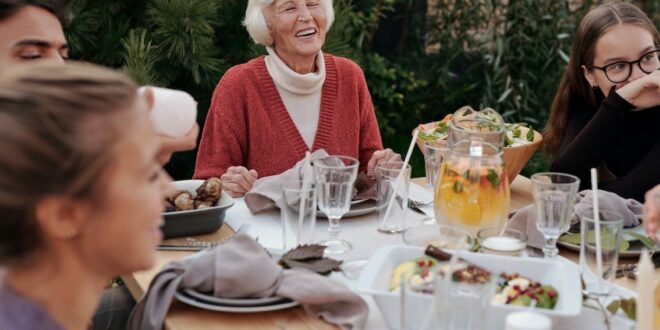In today’s fast-paced world, the simple act of eating together can easily be overlooked. Communal dining is a time for connection, where we share stories, laugh together, and strengthen bonds. It’s not just about the food – it’s about the magic that happens when we gather around the table.
But surprisingly there’s a stack of health and happiness benefits that come with eating together with friends or family. We wanted to dive into the science beyond why eating together as a family or with friends could be the key to a longer, happier, and more fulfilling life. From nourishing your body to nurturing your soul, let’s explore the countless reasons why breaking bread together remains a timeless ritual worth preserving.
The power of shared meals
Sitting down together with family or friends is about more than offloading the stress of your day – it’s about forging connections, nurturing relationships, and cultivating a sense of belonging. When we come together to eat, it’s an opportunity to engage in meaningful conversations, share stories, and create lasting memories.
Nourish both your body and mind
Eating together is not just about the joy of shared company; it also profoundly impacts our physical and mental well-being. Studies have shown that when we dine in the company of others, we tend to opt for nutritious options, including more fruits, vegetables, and whole grains. Moreover, the act of shared dining promotes mindful eating, enhancing our connection to the food we consume. This mindfulness reduces the likelihood of overeating and the negative health consequences that can result.
The importance of eating together as a family was proven by a study published in JAMA Network Open in 2018. Scientists found family meals were linked to a better diet overall, especially among adolescents. Teens who ate together with their families were more likely to consume more fresh produce and less fast food and sugary beverages.
Eating together fosters a sense of community
Dining together is a powerful catalyst for fostering a sense of community. When individuals gather to share a meal, barriers dissipate, and connections deepen. Eating together binds people together – conversations flow, stories are exchanged, and laughter reverberates. If you get the chance to meet local families, experience their way of life, and eat their food together you connect to a destination on a deeper level.
Mental health benefits of communal dining
The act of eating with friends or family promotes a positive atmosphere. By engaging in meaningful dialogue while eating together we can foster a sense of connection, reducing our stress and anxiety. A recent survey by the American Health Association revealed that an impressive 91% of parents reported a significant reduction in family stress levels when meals were shared together on a regular basis. These moments of interaction provide each of us with an opportunity to unwind, share experiences, and seek advice.
Family meals offer emotional support
Sharing meals with loved ones creates an environment that encourages genuine conversation and emotional support. A group of Canadian researchers found the importance of eating together as a family was significant. The report concluded that frequent family dinners can prevent eating disorders, violent behavior, depression, and alcohol and substance use in teenagers.
Dining together the secret to longevity
It’s well known that an active social life may help you live longer, so naturally that extends to the dining table. Many studies have found a correlation between the two, and some suggest social isolation is a mortal risk similar to other major risk factors, such as smoking. The stress of being isolated can weaken one’s immune system, plus those with strong social bonds tend to eat better food and be more active.
Find inspiration in Southern Europe
Across the globe, regions like the Mediterranean, where shared meals are a cornerstone of daily life, boast remarkable longevity. The Mediterranean diet is characterized by fresh produce, lean proteins, and olive oil. Simply picture yourself sitting at a long communal table beneath olive trees or grape vines and you’ll feel less stressed. This diet is associated with lower rates of heart disease and other chronic conditions, plus eating together – as many multi-generational families do at least every weekend – contributes to reduced stress, better mental health, and ultimately, a longer, more fulfilling life.
Ideas for communal dining
Making communal dining part of your life is simple. Once a week, fortnight or month you could schedule a non-negotiable date to share a meal with loved ones. This is a time to leave your phone in another room and switch the TV off. You could make it fun by cooking together, or set a theme and dine around the world. For a nice extra touch, start or end the meal by expressing something you’re grateful for. This positive and sometimes vulnerable prompt will no doubt bring you closer.











Join the Discussion
Type out your comment here:
You must be logged in to post a comment.